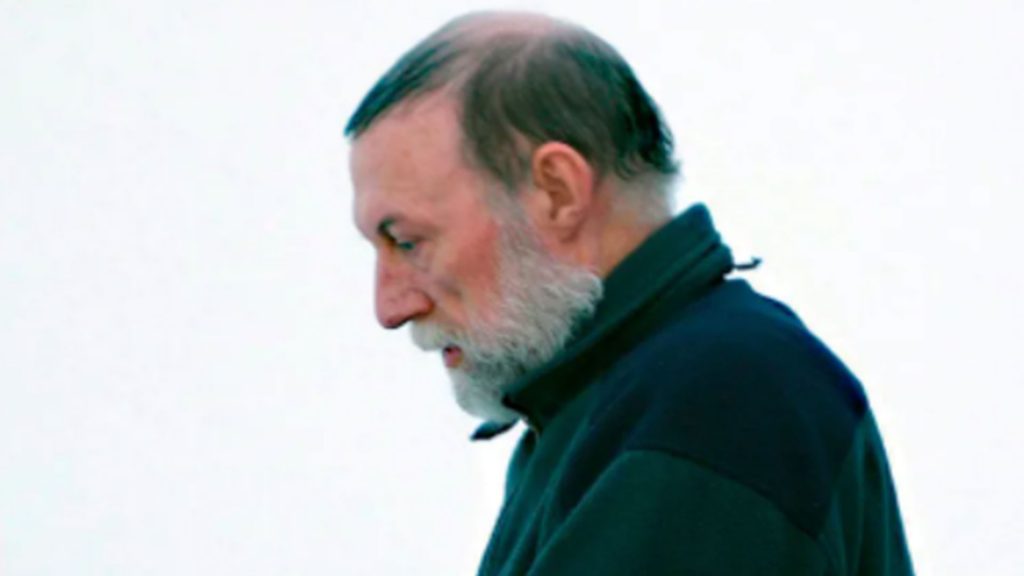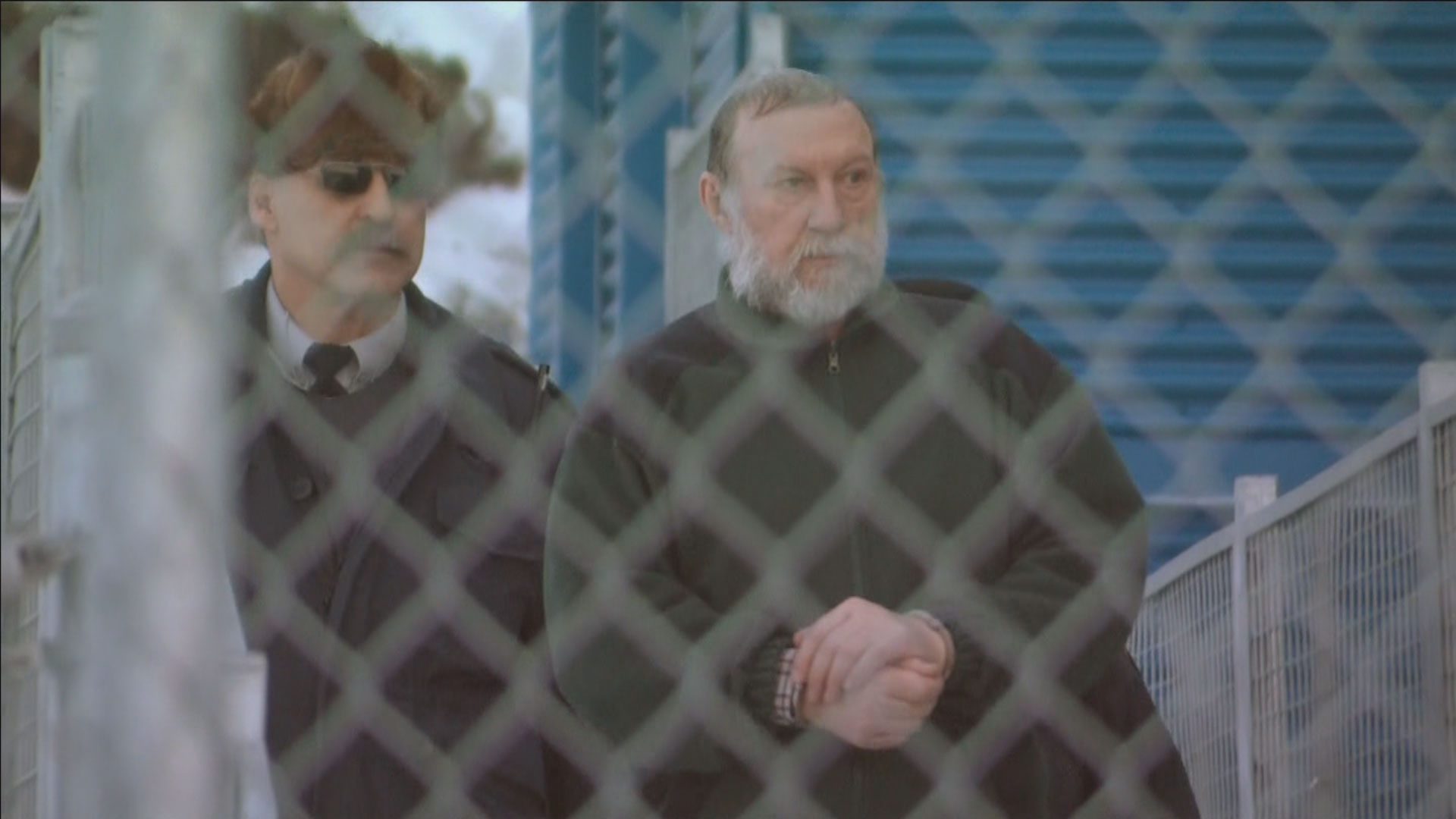
Former priest Eric Dejaeger was arrested in Kingston, Ont. Photo: APTN
Warning: This story contains details of sexual assault that some people may find difficult to deal with. If you feel triggered, please reach out for help at 1-855-242-3310.
Nunavut’s MP says she was “extremely concerned” to learn about the release of Eric Dejeager, a former priest and convicted pedophile who preyed on children, adults and a dog while based in Nunavut.
“I was extremely concerned to hear that Eric Dejaeger was released,” said Lori Idlout in an email to APTN News. “It is a severe injustice that the legacy of abuse, colonialism, and systemic racism inflicted on our communities will last for generations while Dejaeger and others who committed abuse against our children are allowed to walk free.”
Dejaeger, 75, was convicted of sexually assaulting dozens of children during his time in Nunavut and Alberta and was granted statutory release on June 6.
He is a repeat offender and was serving a 19-year sentence for “Rape (X3), Buggery (X4), Bestiality, Indecent Assault Male (X15) Indecent Assault Female (X11), Sexual Assault, and Forcible Confinement,” according to his filed released by the Parole Board of Canada (PBC).
The majority of the more than 25 victims were between the ages of nine and 13. Two of the victims were adults and the youngest was “five or six.”
“You used your position as a priest and groomed victims,” the PBC documents say. “File information indicates you often used physical force to gain compliance and, in some instances, you hit or threatened victims in order to ensure that they followed your direction.
“File information also indicates you had intercourse with your pet dog.”
According to the PBC, Dejaeger has completed several courses while in prison to deal with his sexual issues but still remains a “moderate risk” to society.
Dejaeger’s statutory release – mandatory under the law when an offender serves two-thirds of his sentence – came and went without a hearing, which is standard. Victims aren’t able to appear or oppose the release.
But “victims are entitled to receive information about all forms of conditional release, including statutory release, with respect to the offender that harmed them,” according to the Correctional Service of Canada (CSC).
“The Correctional Service of Canada (CSC) discloses this information to victims who have registered with us to receive this information and does so by letter, telephone or the secure online Victims Portal,” said spokesperson Esther Mailhot. “As part of their right to participation, under the Canadian Victims Bill of Rights, CSC also lets victims know when they can provide information for consideration in decisions regarding an offender’s conditional release.”
According to the CSC website, “victims do not automatically receive information about the offender who harmed them.”
Read More:
Former Nunavut priest convicted of sex crimes against children out on statutory release
And that’s why one of Dejaeger’s victims in Alberta didn’t hear about his release until someone told her husband after hearing it on the news.
“I was out in the garage crying,” said the woman, whose identity remains protected by the court. “No one should find out the way I did.”
The woman, now in her 50s, said Dejaeger pleaded guilty to her charges while he was being sentenced in Iqaluit. His punishment was added concurrently to his sentence, she added.
The woman said she was unaware she could register with the parole board to learn if her abuser would be released.
“If I knew that I would have done it,” she said. “I would have shown up, I would have spoken against him. He should never get out.”
The woman said releasing Dejaeger was wrong.
“They have a responsibility,” she said. “They have a duty to protect vulnerable children.”
Some organizations did get a heads up that Dejaeger was scheduled to be released.
The Oblates of Mary Immaculate in Canada, a “worldwide congregation of priests”, was informed of the decision because Dejaeger originally asked that he be allowed to stay at one of their residences.
The request was denied because the location is across the street from a park where children frequent.
The Oblates, in turn, notified Inuit Tapiriit Kanatami (ITK) they had been approached to shelter Dejaeger although it’s unclear why.
APTN asked ITK whether it felt compelled to notify anyone in Nunavut about Dejaeger’s release.
In a statement to APTN, the national Inuit lobby group didn’t answer the question.
“ITK did receive brief information from the Oblates in regards to a specific priest who committed crimes in Nunavut who was being paroled,” said the statement. “The full details of that case and that parole decision lie with the parole board. ITK does not have and is not in a position to share full details.”
ITK president Natan Obed is working with the Oblates to have Johannes Rivoire, a priest facing several charges of sexual assault in Nunavut, extradited from France where he is living in a retirement home.
“ITK continues to advocate for the full force of the criminal justice system to be brought against those who commit crimes against the most vulnerable in our society,” added the statement. “This includes priests who have evaded and continue to evade justice in Canada.
“The system is imperfect, and we continue to work to advance measures to improve the ways Inuit interact with the federal justice system.”

The Nunavut government did not respond when APTN asked if it opposed Dejaeger’s release or informed people in Nunavut.
Marc Miller, Canada’s Crown-Indigenous relations minister, does have an opinion on what should have happened to Nunavut’s most notorious pedophile.
“You want my view on it?” Miller said at a news conference, “I think people like that should rot in jail, especially for the crimes they committed.”
According to the PBC, if the Correctional Service of Canada feels the inmate would be a threat to society, measures are taken to withdraw the statutory release.
It’s not clear if any measures were taken to declare Dejaeger a dangerous offender.
The PBC noted in its report that Dejaeger can’t have contact with his victims or the victims’ families because: “Your offending caused the victims devastating and ongoing emotional and psychological harm. This condition serves to protect them from further trauma.”
The PBC ordered Dejaeger to live at a halfway house but the location is redacted in the documents.
A spokesperson for the Oblates told APTN they are still prepared to help Dejaeger after he is done with the halfway house.
“After completing a stay in a halfway house, it is possible that DeJaeger (sic) may reside in an Oblate community where we can ensure he follows his release plan, under close supervision and with a full restriction of any activity that could bring him into contact with minors,” said Fr. Ken Thorson. “We have been in touch directly with Inuit Tapiriit Kanatami (ITK) regarding Eric Dejeager’s release.”
According to Idlout, education about the history of colonialization and violence in Nunavut needs to be taught.
“The Liberal government has repeatedly ignored the NDP’s calls for the appointment of a special prosecutor to investigate the crimes that took place at residential schools so other perpetrators can be brought to justice,” she said.
“This government must also do more to protect our communities from abuse, including making sure that judges, law societies and law schools receive cultural competency training to understand the lived situation of Nunavummiut better before abusers are released.”
With files from Kathleen Martens and Mark Blackburn










